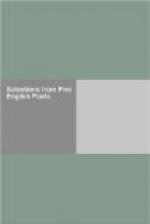Large was his bounty, and his soul sincere,
Heav’n did a recompense
as largely send:
He gave to Mis’ry all he had, a
tear,
He gained from Heaven (’t was all
he wished) a friend.
No farther seek his merits to disclose,
125
Or draw his frailties from
their dread abode,
(There they alike in trembling hope repose,)
The bosom of his Father and
his God.
NOTE.—The Elegy was finished at Stoke Poges in 1750, when the poet was thirty-four years old. It was so popular that one edition followed quickly upon another, and it was even translated into foreign languages.
Notice that throughout the poem the lines are of equal length, each consisting of five feet or measures, and that in a stanza the alternate lines rhyme.
[1.] The curfew was an evening bell which originally warned people to cover their fires, put out their lights, and go to bed. It was instituted in England after the Norman Conquest. The word comes from the French couvrir (cover) and feu (fire).
[2.] Incense-breathing Morn. The poet regards the morning as a person; that is, he personifies morning. Personification is seldom used now, but the eighteenth-century poets delighted in it. It is frequently employed in this poem.
[3.] Glebe, soil, ground.
[4.] The boast of heraldry, i.e. whatever has to do with high rank or pride of birth.
[5.] Where through the long-drawn aisle, etc. It was the custom to bury the poorer people of a village in the churchyard, and the rich or high-born in the church.
[6.] Storied urn. Funeral urns such as were used by the ancients were frequently decorated with scenes from the life of the deceased.
[7.] Animated, i.e. life-like.
[8.] Provoke, call forth, call back to life.
[9.] Full many a gem, etc. One of the best-known stanzas in English poetry.
[10.] Village-Hampden. John Hampden was an English patriot who refused to pay taxes levied by the king without the consent of Parliament, and who died in 1643 from a wound received while fighting for the liberties of England.
[11.] Milton. John Milton (1608-1674), the author of Paradise Lost, is generally ranked as the greatest English poet after Shakespeare.
[12.] Cromwell. Oliver Cromwell (1599-1658), the famous Protector, is now regarded by historians in general as one of the foremost champions of English liberty.
[13.] Still, always.
[14.] Th’ unlettered Muse. In Greek mythology the Muses were nine goddesses who presided over the arts and sciences, song, and the different kinds of poetry. The true poet was supposed to be inspired by them. Gray imagines a new kind of Muse who inspires the writers of crude epitaphs.
[15.] For thee, who mindful, etc. Gray refers to himself as the writer of this poem.




